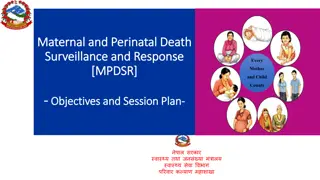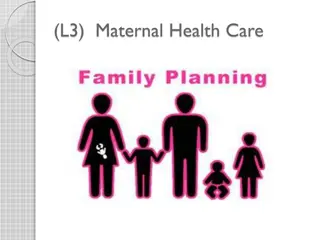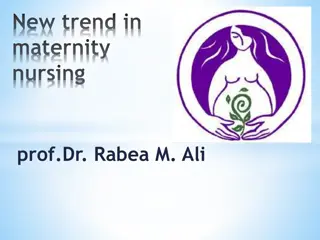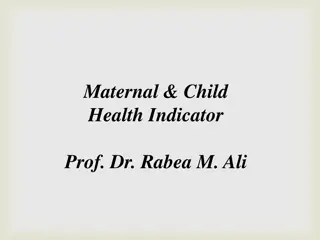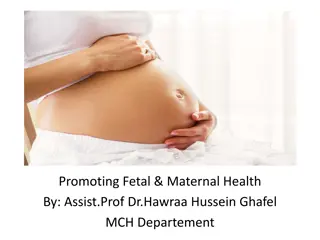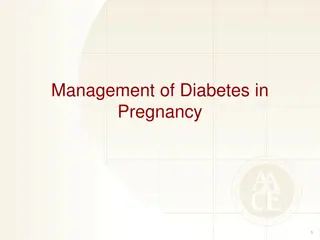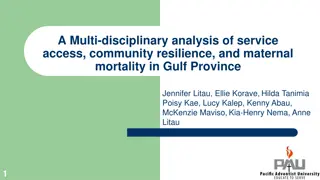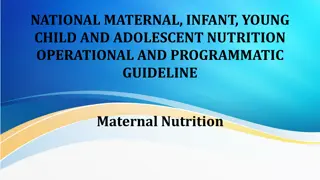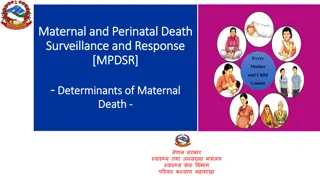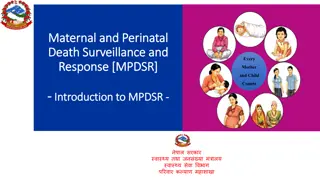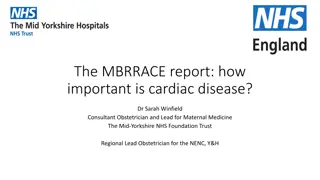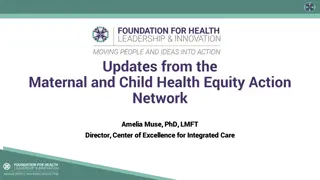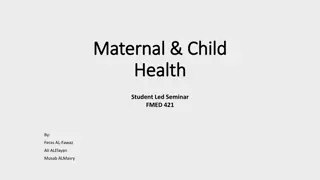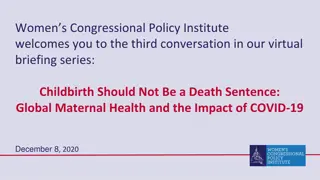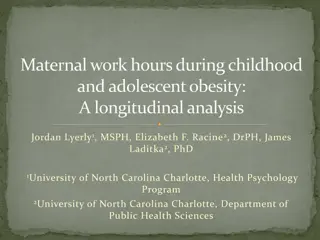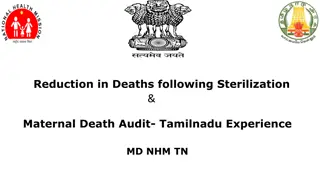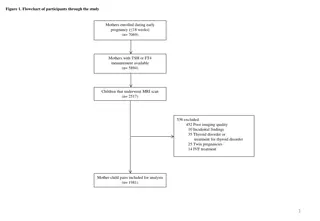Importance of Preconception Care for Maternal and Child Health
Preconception care involves biomedical interventions provided to women and couples before conception to improve their health status and reduce factors contributing to poor maternal and child health outcomes. It aims to enhance maternal and child health in both the short and long term by addressing preventive, promotive, and curative measures. The care includes periconception and interconception interventions to reduce unplanned pregnancies, perinatal deaths, and improve overall health outcomes. Implementation of preconception care can significantly reduce maternal and childhood mortality and morbidity, benefiting both high- and low-income countries. By addressing various health aspects, preconception care plays a crucial role in improving the health and well-being of women and promoting better public health outcomes.
Uploaded on Jul 13, 2024 | 0 Views
Download Presentation

Please find below an Image/Link to download the presentation.
The content on the website is provided AS IS for your information and personal use only. It may not be sold, licensed, or shared on other websites without obtaining consent from the author. Download presentation by click this link. If you encounter any issues during the download, it is possible that the publisher has removed the file from their server.
E N D
Presentation Transcript
Preconception biomedical, interventions to women and couples before conception occurs, aimed at improving their health status, and reducing behaviours and individual and environmental factors that could contribute to poor maternal and child health outcomes. Its ultimate aim is improved maternal and child health outcomes, in both the short and long term care is the and provision social of behavioural health
At least three overlapping terms are used in the reviews tabled at the meeting: Preconception care provision of preventive, promotive or curative interventions before conception occurs; Periconception care provision of interventions in the period extending from 3 months before to 3 months after conception occurs; Interconception care provision of these interventions between two pregnancies health and social these
4 out of 10 women report that their pregnancies are unplanned Perinatal deaths are 50% higher among babies born to adolescent mothers Up to 10% of pregnancies among women with untreated gonococcal infections result in perinatal death
Preconception care can make a useful contribution to reducing maternal and childhood mortality and morbidity, and to improving maternal and child health in both high- and low-income countries. In high-income countries, in addition to optimizing general preconception health and risk awareness of the population as a whole, preconception care can address the relatively higher levels of maternal and childhood mortality and morbidity that exist in some pockets of socially marginalized and economically deprived families and communities. In low-income countries, similar but larger effects may be achieved.
Potential benefits of preconception care From the perspective of health outcomes, in the short term preconception care could reduce pregnancies that are too early, pregnancies that are too close, and unplanned pregnancies. Preconception care reducing the risk of genetic disorders and environmental exposure, to reducing maternal and childhood mortality, and to improving maternal and child health outcomes. could contribute to
It could also contribute to improving the health and well-being of women in other areas of public health, such as nutrition, infertility and subfertility, mental health, intimate partner and sexual violence, and substance use. In the long term, preconception care could contribute to improving the health of babies and children as they grow into adolescence and adulthood.
By supporting women to make well-informed and well-considered decisions about their fertility and their health, preconception care could contribute to the social and economic development of families and communities. By creating awareness of the importance of men s health and men s behaviours on maternal and child health outcomes, and by promoting male involvement, preconception care could result in additional benefits. From the programmatic perspective, preconception care provides a window to include interventions that have not traditionally been included in maternal,newborn and child health programmes, such as reduction in use of and exposure to tobacco.
Preconception care interventions Nutritional deficiencies and disorders Vaccine-preventable infections Tobacco use Environmental risks Genetic disorders Early pregnancies, unwanted pregnancies, and pregnancies in rapid succession Sexually transmitted infections (STIs), including human immunodeficiency Virus (HIV)
infertility and subfertility female genital mutilation mental health disorders, including epilepsy psychoactive substance use intimate partner and sexual violence. These interventions would need to be delivered using a mix of methods: health education and promotion vaccination nutritional supplementation and food fortification provision of contraceptive information and services screening, counseling and management (medical and social).
Screening for anemia Supplementing iron and folic acid Information, education and counselling Monitoring nutritional status Screening for diabetes mellitus Management of diabetes mellitus Counselling people with diabetes mellitus Monitoring blood glucose (also in pregnancy) Promoting exercise Salt iodization
Too-early, unwanted and rapid successive pregnancy Keeping girls in school Influencing cultural norms that support early marriage and coerced sex Educating girls and boys about sexuality, reproductive health and contraceptive use Building community support for preventing early pregnancy and for contraceptive provision to adolescents Enabling adolescents to obtain contraceptive services Empowering girls to resist coerced sex Educating women and couples about the dangers to the baby and mother of short birth intervals Providing contraceptives
Thanks Thanks



